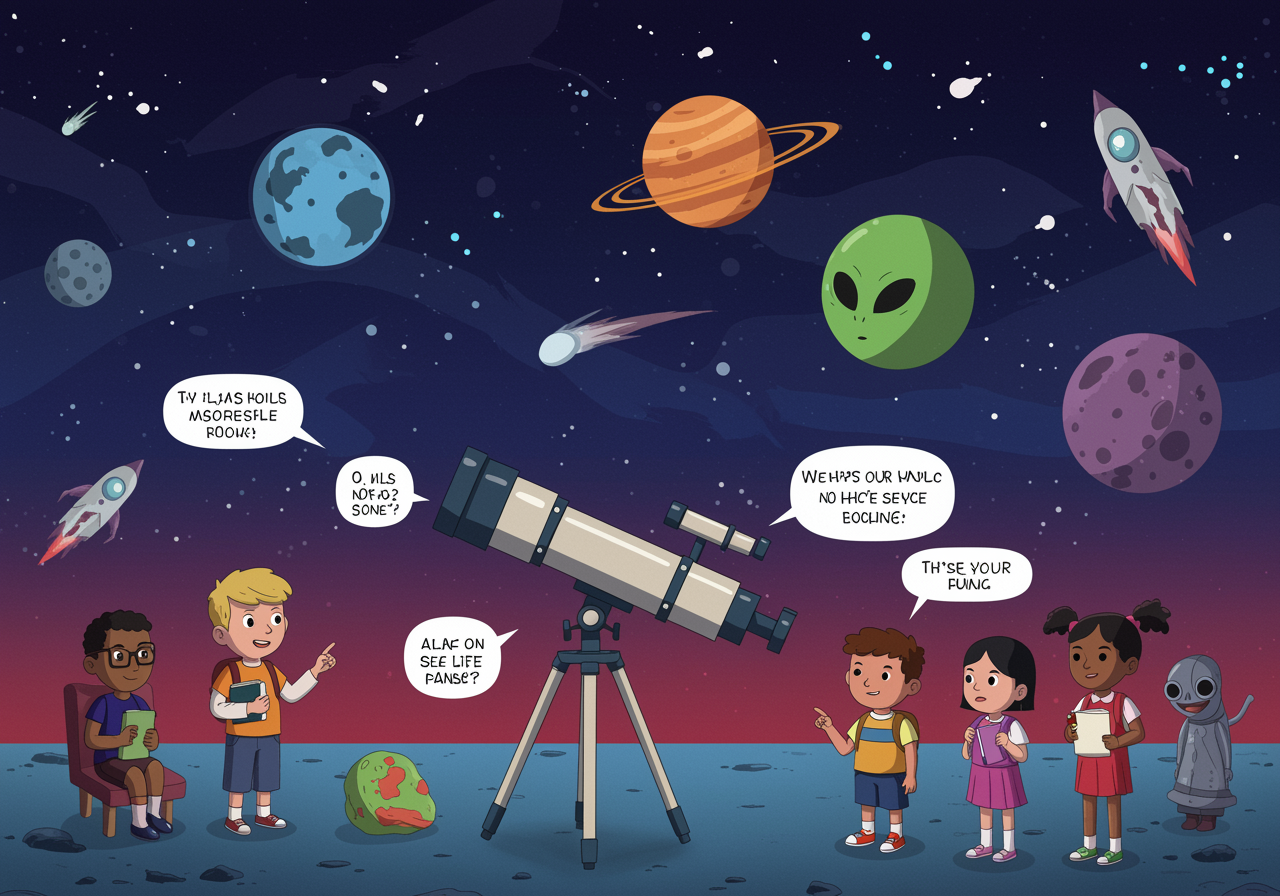Are We Alone? The Great Space Debate That’s Got Everyone Talking

Why some people are convinced aliens are out there while others think Earth is one-of-a-kind
Dive into the ultimate cosmic mystery that has scientists, kids, and parents debating whether we’re alone in this massive universe or sharing it with alien neighbors.
Overview
Imagine you're the only kid at a massive school with billions of classrooms, but you've never seen another student. Would you think you're alone, or would you bet there are other kids somewhere in those endless hallways? That's basically the debate about aliens! Scientists look at the same incredible universe and come to totally different conclusions. Some see the mind-blowing size of space and think 'There HAS to be someone else out there!' Others look at how special and rare life seems to be and think 'Maybe we really are the only ones.' This isn't just about little green creatures in flying saucers—it's about math, science, and how we make sense of the biggest mystery ever.

Understand in 30 Seconds
Get up to speed quickly
- The Numbers Game: With billions of stars and planets out there, some people think the odds are huge that life exists somewhere else. Others point out that just because something's possible doesn't make it likely.
- The Silence Mystery: If aliens are common, why haven't we heard from them yet? This puzzle has scientists scratching their heads and coming up with wildly different explanations.
- What Counts as Evidence?: Some people want concrete proof like radio signals or alien visitors. Others think the math and science already make a strong case that aliens probably exist.
- Time and Distance: Space is so incredibly huge and old that even if aliens exist, finding each other might be like finding a specific grain of sand on every beach in the world.
Real Life Scenario
Situations you can relate to
Think about moving to a brand new city where you don't know anyone. You might wonder: 'Are there other kids my age here who like the same things I do?' Some of your friends might say, 'Of course! It's a huge city with millions of people. There's got to be someone like you!' But others might warn, 'Don't get your hopes up. You're pretty unique, and finding the right friend takes time.' Now imagine that city is the size of the entire universe, and instead of looking for friends, you're looking for any life at all. The 'believers' look at trillions of planets and say the math is on their side. The 'skeptics' point out that we still don't really understand how life started on Earth, so maybe it's incredibly rare. Both groups are using the same information but reaching different conclusions. What would you think?

Role Play
Spark a conversation with “what if” scenarios
What if you were an alien scientist trying to contact Earth?
- Role play: Take turns being alien researchers who have to decide how to reach humans. Discuss the challenges: Should you send radio signals? Visit in person? What if humans aren't ready? What if they're dangerous?
What if you had to convince a skeptical friend that aliens probably exist?
- Role play: One person plays the skeptic who thinks Earth is unique, the other argues for alien life. Use real facts about the number of planets, the age of the universe, and the chemistry of life.
What if you were designing Earth's first message to aliens?
- Role play: Work together to create a simple message that aliens could understand. Think about what you'd want them to know about humans and what questions you'd ask them.
FAQs
Frequently asked questions people want to know
Have we actually found any proof of aliens?
Not yet! We've found planets that could support life and detected mysterious signals from space, but nothing that definitively proves alien life exists.
Why don't aliens just visit us if they're so advanced?
Great question! Maybe they have and we missed it, maybe they're not interested, maybe they're too far away, or maybe they don't exist. Scientists call this the Fermi Paradox.
Could aliens be completely different from life on Earth?
Absolutely! They might be based on different chemistry, live in extreme environments, or even exist in ways we can't imagine. That's part of what makes them so hard to find.
Examples in the Wild
See how this works day to day
- NASA's Kepler Space Telescope has found over 4,000 confirmed exoplanets, with many in the 'habitable zone' where liquid water could exist (NASA Exoplanet Archive)
- The SETI Institute uses radio telescopes to listen for signals from alien civilizations and has detected unexplained signals like the famous 'Wow!' signal from 1977 (SETI Institute)
- Scientists recently discovered complex organic molecules on Mars and detected phosphine gas in Venus's atmosphere, both potential signs of life (NASA Mars Exploration Program)
- The Drake Equation, created by astronomer Frank Drake, estimates there could be between 1,000 to 100 million communicating alien civilizations in our galaxy (SETI Institute)
In Summary
What you should know before you start
- People disagree about aliens because they weigh the same evidence differently—some focus on the huge numbers, others on how rare life seems to be
- The universe is so big and old that even if aliens exist, finding each other is incredibly challenging
- Scientists are actively searching for alien life using telescopes, space missions, and radio signals, but haven't found definitive proof yet
- This debate combines real science with personal beliefs about what's possible and probable in our amazing universe
Pro-tip for Parents
You got this!
If your child seems disappointed that we haven't found aliens yet, remind them that science is all about the journey of discovery, not just the destination. Some of our greatest scientific advances have come from searching for things we weren't sure existed. The tools and methods we develop while looking for aliens help us understand our own planet, discover new technologies, and push the boundaries of human knowledge. The search itself is just as exciting as finding answers!

Keep an Eye Out For
Find these examples in everyday life
- News about new exoplanet discoveries or potentially habitable worlds found by space telescopes
- Reports about unusual signals detected by radio telescopes or space agencies investigating mysterious phenomena
- Movies, documentaries, or books about space exploration that can spark conversations about the search for life
Explore Beyond
Look up these related research topics
- How do scientists search for life in extreme environments on Earth, like deep ocean vents or Antarctica?
- What would it take for humans to become a space-traveling civilization that could contact aliens?
- How do we figure out if a planet could support life without actually visiting it?